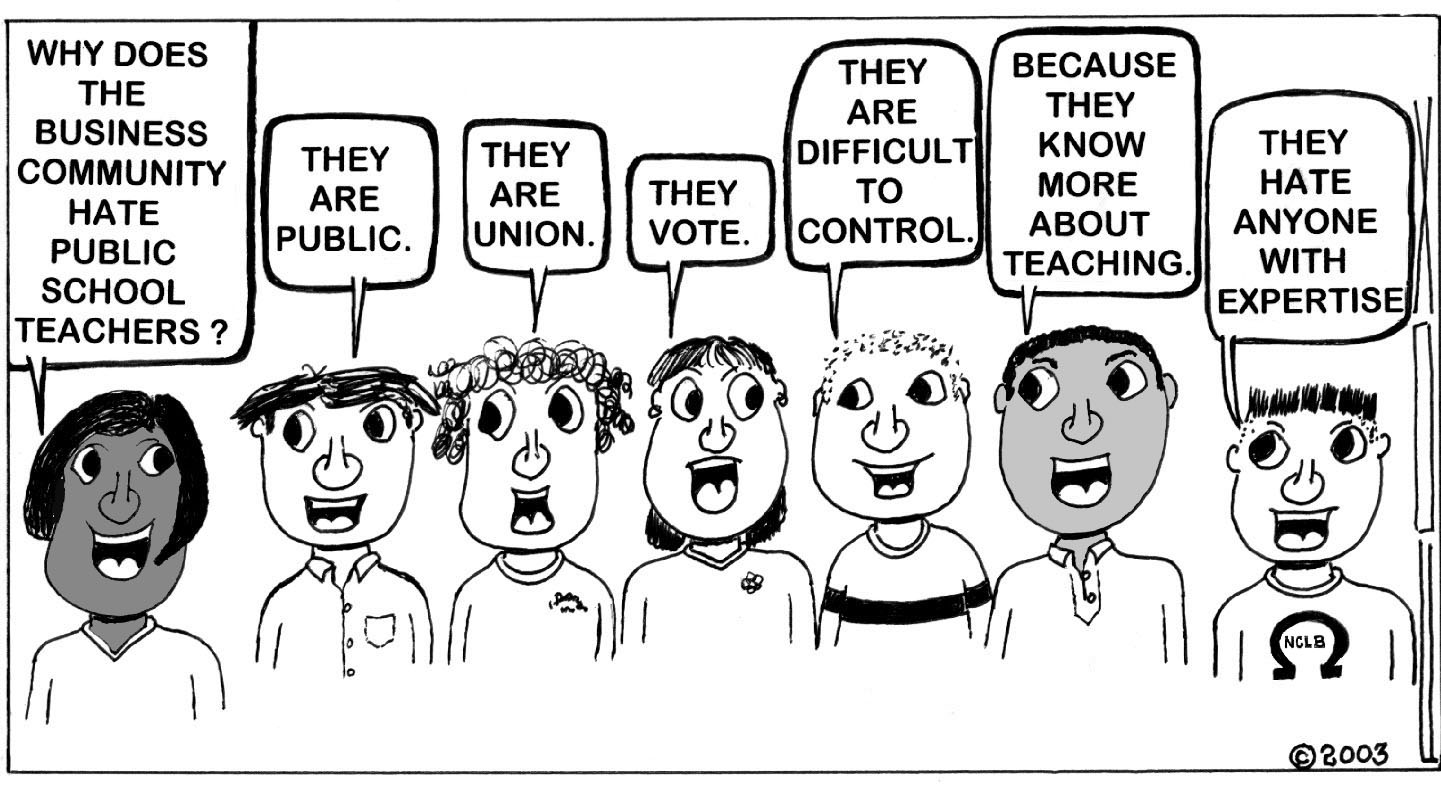|
Public schools in recent years have sustained assaults from believers in the privatization of the public education system. The powers that be plan a data-based reinvention of teacher education that will require the closing, or reinvention of colleges of teacher education. If these plans go through, a majority of the nation's teachers and teacher educators could lose their jobs in the next 10 years, replaced by people who will largely be temp workers-making minimum wages
| |||
As a student of history who has watched how the financialization of capital and the expansion of technology has affected labor markets, housing markets and the political process, I am incredibly pessimistic about the future of public education.
After the 2007-2008 financial crisis in the United States, a growing number of those with investment capital seeking profitable outlets are seeing education - and educational technology - as growth areas. Resistance by students, parents and educators to high-stakes standardized testing and the Common Core State Standards confronted them with a temporary setback, but now they are poised to make an end run around the Opt Out movement by concentrating on "personalized learning" which requires a huge investment in computerization of classrooms as well as software.
Along with this remaking of schooling, the powers that be plan a data-based reinvention of teacher education that will require the closing, or reinvention of colleges of teacher education. If these plans go through, a majority of the nation's teachers and teacher educators could lose their jobs in the next 10 years, replaced by people who will largely be temp workers making little more than minimum wage.
This isn't just pie-in-the-sky thinking. It is happening in higher education with the switch to adjunct labor. I fear it is about to sweep through our public schools with the force of a juggernaut.
The higher education model should be a warning to what is in store for public K-12 educators. During the last 20 years, tenured faculty positions in universities have remained frozen, even in the face of dramatic growth in student enrollment, while administrative positions have proliferated and administrative salaries have skyrocketed. Students have not benefited. More and more are graduating with huge debt that they are unlikely to liquidate in a tight labor market.
But faculty have been hit even harder. The only growth in faculty hiring has been in the area of part time, or adjunct faculty, who were nearly 50 percent of the teaching staff in higher education in 2015, according to a report by the American Association of University Professors. It says in part:
The use of contingent faculty in higher education in the United States has grown tremendously over the past three decades. In 1975, only 30.2 percent of faculty were employed part time; by 2005, according to data compiled by the AAUP from the Integrated Postsecondary Education Data System (IPEDS), part-time faculty represented approximately 48 percent of all faculty members in the United States.
This growth in the use of part-time faculty has occurred despite low pay, almost nonexistent benefits, inadequate working conditions, and little or no opportunity for career advancement.
This, I fear, is where we are heading in public education with personalized education. It is all the rage in education today, the idea that kids sitting at computers doing "personalized" work on computer programs is the way of the future.
I would not be surprised if, 10 years from now, well over 50 percent of classroom personnel will be part time workers supervising students sitting on computers working on "individualized" programs - because policymakers have taken a very narrow view of personalized learning. Too often in the past education policy-makers have taken narrow views of reform - all to the detriment of generations of young people - and there is no reason to think this would change now.
The damage here to teachers, students and the middle class would be enormous. But this, I fear is where we are headed - unless parents, educators and students decide to resist on a scale far beyond anything we have seen so far in the movement against corporate-based education reform.
[Mark Naison is a professor of African American Studies and History at Fordham University and director of Fordham's Urban Studies Program. He is the author of three books and over 100 articles on African-American history, urban history, and the history of sports, and he blogs at "With a Brooklyn Accent." A number of his posts have appeared on The Washington Post's The Answer Sheet, including one titled, "Why Teach For America can't recruit in my classroom."]
Reposted from Portside.
| |||
Sunday, March 27, 2016
Why I Am Pessimistic About the Future of Public Education
Labels:
charters,
corporate agenda,
public schools,
teachers
Subscribe to:
Post Comments (Atom)


No comments:
Post a Comment